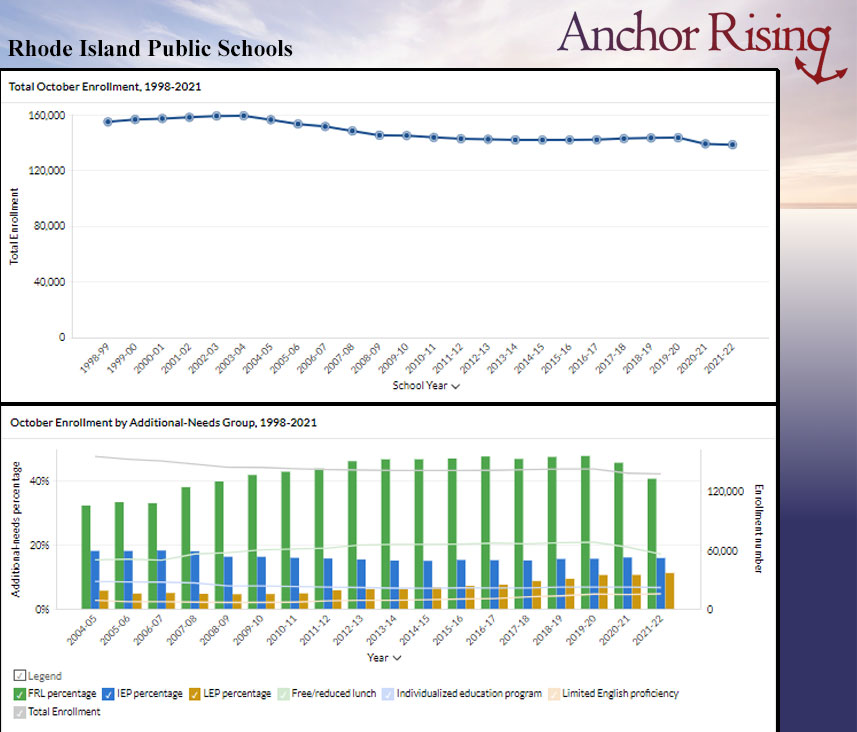Our system is set up to ensure that infrastructure, like school buildings, is left to rot. That dynamic is inevitable when (1) budgeting and negotiations are tilted so heavily in favor of labor and (2) taxpayers can be bullied or forced into spending the additional money to repair or replace buildings when they become bad enough. The question is whether that tendency will remain viable as the number of students in the schools continues to shrink year after year and decade after decade.
Tamara Sacharzcyk mentions four school districts in an article about mounting campaigns to spend hundreds of millions of dollars on school buildings: Smithfield, Johnston, Central Falls, and Portsmouth. Let’s take a quick look at the enrollment and budgets of these districts using Anchor Rising’s enrollment tool and audit data.
As with so much else, the transparency is slipping on the audit front, but fortunately, the Wayback Machine has audits back to fiscal 2009, so we’ll compare that year to 2020, which is the latest available. Because Central Falls is largely state funded, I added the state’s revised aid number. (Note that fiscal years tend to straddle calendar years, so I’ll use the 2008-09 school year as corresponding to the 2009 audit, and so on.)
- Smithfield
- Enrollment: 2,545 to 2,382, down 6.4%
- Education activities spending: $33,482,943 to $44,817,126, up 33.9%
- Per pupil spending: $13,156 to $18,815, up 43.0%
- Johnston
- Enrollment: 3,227 to 3,258, up 1.0%
- Education activities spending: $56,946,555 to $64,208,657, up 12.58%
- Per pupil spending: $17,647 to $19,708, up 6.7%
- Central Falls
- Enrollment: 3,081 2,878, down 6.6%
- Education activities spending: $42,490,909 to $42,364,362, down -0.3%
- Per pupil spending: $13,791 to $14,720, up 6.7%
- Portsmouth
- Enrollment: 2,955 to 2,426, down 17.9%
- Education activities spending: $38,467,906 to $42,477,570, up 10.4%
- Per pupil spending: $13,018 to $17,509, up 34.5%
Keep in mind that enrollment numbers were universally down from a decade earlier. I also should note that a massive influx of federal fiscal stimulus aid around this time may have affected the numbers. More importantly, keep in mind that municipalities tend to carry their capital expenditures for school buildings outside of the school numbers.
Based on these numbers, we see that enrollment is way down in most places (Johnston being an exception), while budgets are way up. For these schools, inflation may have eaten up the increase, but on the other hand, schools’ performance has generally deteriorated.
As communities argue over indebting themselves (and state and federal taxpayers) for buildings, they must take these broader numbers into account. Damaged ceiling tiles may make for compelling images in a campaign for debt, but they should be a compelling argument that sufficient maintenance is not being done.
Featured image by Cleyton Ewerton on Unsplash.
[Open full post]Somewhere in the wilds of Rhode Island progressive social media in the past couple months, I came across the Rhode Island Department of Corrections’ “Fiscal Year 2020 Annual Population Report.”
I think the context in which it was deployed like a statistical weapon was to support the claim that inmates at the state Adult Correctional Institution (ACI) in Cranston are disproportionately minorities from other communities, so counting them in the population of a more-white city steals the voice of people of color… or something like that.
These direct, proportional comparisons have a surface plausibility, because if race is an incidental quality, it ought to have no effect on incarceration. On the other hand, at the next layer down, the claim of “systemic racism” blurs into uselessness if the correlation is between race and criminal behavior, because the discussion shifts to the factors that drive a certain group toward crime. Without doubt, that’s an important question sociologically, but when talking about prisons, the progressives come up against the question of whether incarceration ought to be proportional to criminality.
If they bothered to dig into the RI DOC’s annual study, progressives might justifiably fear that their promotion of proportional thinking will come back to bite them. Consider the chart shown in the featured image of this post. It shows that minorities, especially black inmates, are disproportionately represented in the prison population. “Aha!,” the progressives say. “This is proof of systemic racism.”
But look at the variation from column to column. In a racist society that’s attempting to operate under the cover of a supposedly fair system, one might expect diminishing returns on racism. Those darned police would be dragging in minorities on frivolous charges, but even going through the motions of justice, they would be held while awaiting trial at a lower rate and then convicted at an even lower rate, because the police would only be arresting whites who really deserved it and “the system” would be deciding that minorities had to be held before convicted more often, with the “sentenced” population coming closest to just deserts, though still imbalanced.
Except… the percentages of inmates who are black goes up from all along the series. The fact that blacks and Hispanics move in different directions according to this view suggests that the “systemic racism” hypothesis is, at the least, problematic. If the police are racist, why are they so quick to bring in white people to be committed? And if the portion of the justice system that handles things before trial is racist, why do the hold blacks at a lower rate than indicated by their sentencing? And if the trial system is racist, why is it so much more likely to incarcerate whites?
A creative race huckster could no doubt come up with answers to these questions that fit the data in any given year. Yet, when once one enters on this level of analysis, the charts necessarily become mind-boggling from the progressive point of view. Notably, the system begins to look terribly anti-male, as if it laughs off female violence while arresting men left and right for nonviolent crimes that don’t result in conviction.
Maybe we need a more rational lens than identity politics to understand what’s going on.
Featured image by Justin Katz.
[Open full post]Hopefully, an unanticipated silver lining to our society’s COVID-response overkill will be a return among the masses to healthy skepticism about experts. We all operate by some unarticulated calculation — let’s call it an assessment of action function — then one variable should, yes, be the best available calculation of probability, but that variable has to be divided by some factor of doubt.
During COVID, we’ve given the keys of government to experts as if the doubt factor is nearly nonexistent and the best model available must be assumed to be accurate. But then, there’s the Omicron variant:
[Open full post]The number of new positive cases of COVID-19 reported in South Africa has continued its downward trend despite increased testing, according to South African National Institute of Communicable Diseases (NICD) data. …
“The Omicron outbreak in SA [South Africa] with its extraordinary fast rise, and apparently nearly equally fast fall, is one of the most mind-boggling things I’ve ever seen during my career as an infectious disease epidemiologist,” Balloux stated on Twitter. …
The current trend appears to vary from that projected by a pre-print study in the UK that sets out to model the effects of the Omicron variant in England.
A controversial teacher training that the Highlander Institute prepared for the Westerly school district exposed two tricks that smuggle racist critical race theory (CRT) into Rhode Island schools: assuming “marginalized students” have greater affinity for a left-wing ideology, and brushing aside established systems that, presumably, have been serving non-marginalized students well.
To understand how these tricks are played, it’s helpful to review the material of another prominent government contractor, WestEd. This company received over $2,000,000 from the State of Rhode Island over the 2019-20 and 2020-21 school years to, among other things, develop curricula to help students “catch up” from the harm done by the government’s COVID shutdown.
In brief, the method is to introduce theories and techniques that are reasonable on their face, but that are joined with ideological preferences that are communicated in hidden assumptions. As suggested in the above-linked post about Westerly, favored (minority) groups have their heritage, experiences, and cultures reinforced as positive and defining, while disfavored (majority) groups have their own heritage, experiences, and cultures deconstructed and maligned.
The instruction to do this is not included in PowerPoint presentations or official documents. Instead, it’s simply understood from indoctrination in teacher education and the cult-like expectation that the truth is radical. The bias does slip through, though, in explanations and examples.
One of the reasonable-sounding concepts that WestEd promotes is “funds of knowledge.” Basically, teachers are told to find anchors in their students’ lives to make lessons more tangible for them. WestEd’s source documentation encourages teachers to create a Funds of Knowledge Inventory Matrix for each student, capturing their experiences and noting how the subjects being taught might apply in a special way to that student.
The fundamental premise here is that most school-based practices, curricula, and behaviors are based on mainstream, middle class norms and perspectives.
This might even seem like an obvious thing to do, but an assumed priority slips in to make the matrix a tool to manipulate:
By integrating patterns of learning, knowing, and doing that are familiar to culturally and economically diverse students, academic content becomes easier to connect to their lives and is understood on a deeper level.
In the example, the teacher visits the home of one student, Ruby, whose family is from El Salvador. The teacher (creepily) takes note of the contents of Ruby’s house (including her parents’ keychains) and brainstorms ways in which they might have educational application. Mostly, it’s dry and obvious, but here’s the brainstormed “classroom application” from the teacher’s note that Ruby’s house has many images of Jesus Christ and angels:
For social studies, we could compare Christianity with other prominent religions around the world and research different religions and places of worship in our city.
For math, we could compare numbers of practicing members of the different religions around the world.
The teacher tends to see other details from the student’s life as values to bring into the classroom for the purpose of reinforcing them and introducing experiences to the other children. In language arts, for example, the teacher considers having “Ruby’s mom to talk about El Salvador and her experiences with Spanish in the U.S.”
When it comes to a traditionalist religion, however, the impulse is to minimize its uniqueness. Ruby is Catholic, so the teacher leverages this “fund of knowledge” to introduce her to other religions. The goal isn’t to celebrate something unique, but to wash her religion out as nothing special.
Absent the unspoken ideological assumptions, we could easily imagine ways in which knowledge of a student’s Catholicism could be helpful to teach concepts. The Bible, obviously, is full of stories and lessons that apply not only to life but to every academic subject. So is the theology generally. Ruby’s family believes God is a Trinity, right? So, what shape has three sides? How about an art project drawing a Catholic icon?
To the contrary, as in the blockquote above, the very objective of the “funds of knowledge” approach is to find “patterns of learning, knowing, and doing that are familiar to culturally and economically diverse students.” In this framing, Catholicism has the feel of the “mainstream, middle class norms and perspectives” that teachers are being trained to avoid.
The question returns: What if most of the students are “mainstream, middle class” students? Shouldn’t the goal be “to connect to their lives,” too?
[Open full post]Well, salmon should be hoping for global warming, anyway:
Melting glaciers may produce thousands of miles of new Pacific salmon habitat, a study published Tuesday by Nature Communications found.
As glaciers in the mountains of western North America melt, or retreat, they could produce around 4,000 miles of new Pacific salmon habitat by the year 2100, the data showed.
Just intuitively, I’ve long wondered why the warming of the planet should be considered bad. Warmth is energy and life.
Of course, this is where the alarmists will prophesy deadly storms and the planet spinning off its axis, but if we put that aside as yet to be proven, a changing climate is about the tradeoffs in nature. Salmon like new streams; some other animals liked things the way they were.
There’s something reactionary in climate alarmism (which is interesting, given its leveraging for revolutionary ends). The way things were when we first learned about them always feels right in some sense, even if change is neutral or better.
[Open full post]Remember when the American military accidentally blew up an aid worker and seven children in his family? Yeah, well, nobody will face consequences for that:
“What we saw here was a breakdown in process and execution in procedural events, not the result of negligence, not the result of misconduct, not the result of poor leadership,” Defense Department spokesman John Kirby told reporters. “So I do not anticipate there being issues of personal accountability to be had with respect to the August 29 airstrike.”
Let’s cut to the chase. Joe Biden wanted the military to kill somebody to help him through a difficult news cycle, and they followed through. There is nobody to hold accountable, even the Big Guy, whom the news media is seeking to bolster as much as possible.
Mission accomplished.
[Open full post]As we construct the stories by which we understand reality, we tend to romanticize people when they’re generalized. In healthcare, for instance, patients are “people who need help,” and we have a set of emotions and moral ideas associated with them as a concept.
The problem is people need all sorts of kinds of help, in different degrees and of different natures. The help one person needs could be help with whatever personality trait it is that leads them to abuse the healthcare system. When we zoom in to the individual person or the particular situation, the romanticism can evaporate.
A person with a lifetime of collected individuals and particulars, like Michael Morse, can gain a very unromantic impression of “people who need help.” Looking back at his time as an EMS, he writes that he didn’t expect to learn that “mildly Ill people, younger than [him] would call 911, lay in bed until [they] arrived, allow others to physically carry them from their homes and then wait for 8 hours crammed into an overcrowded emergency room with other mildly Ill people.”
This wasn’t all patients, of course, but it was some, and they have to be included in our de-romanticized idea of who uses these services when we have public policy debates about them. Writes Morse:
But the most unbelievable thing is nobody has the courage to reign in the waste, abuse and frivolity that plagues EMS, not the politicians, not the Fire Departments or their unions, not the ambulance companies, the hospitals, the doctors or even the medics on the street.
I’m not sure courage is the problem. As Morse goes on to note, the participants all profit from the situation. A lack of reasonable standards also covers them on the other side, because nobody is to blame if the intention is to help everybody and “the system” just can’t accommodate them. It’s not the people to whom we’ve assigned the task of managing the system, because they just want to help, and they’ve told us they need more and more. It’s the fault of the taxpayers or corporations or whatever bogeyman we want to focus on for not supplying what is needed.
These are the incentives that inevitably arise when we declare goods and services to be “rights” and separate the recipient from the payer. For some reason, when rights are things that we are permitted to do, we easily understand that they can be abused, but when rights are things that we are entitled to be given, we romanticize away the possibility of abusing the gift.
Featured image by Adhy Savala on Unsplash.
[Open full post]On WNRI 1380 AM/95.1 FM, John DePetro and Justin Katz discuss:
- The mask mandate cometh
- Omicron looms
- Union pocket-lining passes
- Press conference disrupted
- A neighborhood’s sudden homeless problem
- The RI Political Co-Op’s camping vacation
- Voter lists (partially) cleaned
Featured image by Kyle Head on Unsplash.
[Open full post]This deliciously contrarian article by Patricia Adams and Lawrence Solomon suggests that our planet is increasingly green, no thanks to the environmentalist mania of the last half-century in Western countries:
The planet’s ecology is thriving thanks to carbon dioxide, despite first world policies that are undermining it. The ironic benefactors in this story are countries of the third world, led by China, whose emissions are doing the most to green the planet.
Up, up, up. Carbon dioxide, also known as “nature’s fertilizer,” has steadily been enriching Earth’s atmosphere, from 320 parts per million in 1970 to 365 parts in 2000, to more than 412 parts today. The evidence of a flourishing planet—once anecdotal—is now plain to see, thanks to satellite imagery that has been monitoring the amount of greenery on the planet since 1979.
This seems plausible to me, but you don’t have to buy it to take the lesson. Nature has a process for addressing CO2 (plants) and a process for dealing with increases and decreases (expansion or contraction of green areas). Your models of the future have to account for this, and you can’t really say whether such changes are good or bad until you’ve got decades to watch how things play out… especially when your proposed solutions force people to struggle in the present.
[Open full post]One of the questions on my mind when I thought to create the Rhode Island Public Schools October Enrollment application in Anchor Rising’s People’s Data Armory was the effect of COVID and shutdowns. As the chart below shows, enrollment in 2020 was down about 3% from the prior year, and it slid a bit rather than recovering in 2021.
I didn’t put it in the chart, but if you change the race-based chart of the application to show 100% vertical bars, you can see that this shift didn’t change underlying racial trends. Statewide, the percentage of the student body that is white is dropping by about one percentage point every year, meaning the schools will be “majority minority” within four years.
A deeper investigation would show what this means, in practice. This isn’t an evenly distributed shift. The percentage of white students in Providence, for example, has been going down, but not by 1% per year, mainly because there aren’t that many white students in the system to begin with. Meanwhile, Central Falls has actually been increasing its percentage of white students. It looks like what’s happening is that majority-white districts are simply shrinking more quickly. From what I’ve noticed thus far, South Kingstown, which is still 82% white, leads the state in enrollment lost by percentage.
Its schools are currently at 59.5% their size at peak in the 1999-00 school year. Thus, the percentage of minority students in the district is increasing as a percentage, but only because white students are disappearing. (Among minority groups, what’s happening is that Hispanics and multi-racial students are replacing black and Asian students.)
Returning to the state overall, the second chart I’ve included below contains something of a mystery. It shows that low-income students (as demarcated by involvement with the free or reduced lunch program) are way down since the pandemic started — even more in 2021 than in 2020.

Featured image by Rene Bernal on Unsplash.
[Open full post]







